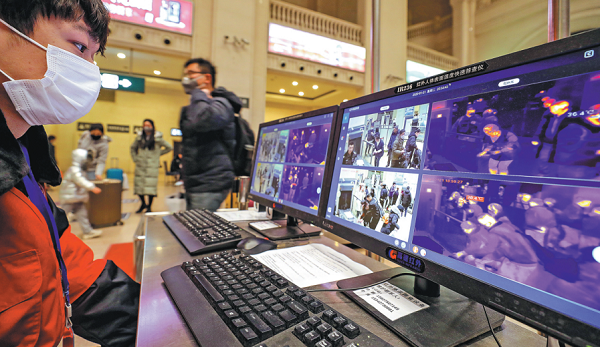New coronavirus cases rise to 571 in Chinese mainland
Latest on pneumonia epidemic:
Cases of the new coronavirus pneumonia disease rose to 571 on the Chinese mainland as of midnight of Jan 22, including 95 in critical condition, and fatalities rose to 17, China's National Health Commission said on the morning of Jan 23.
In addition, 393 suspected cases were reported as of midnight of Jan 22. All the reported deaths were in Hubei province, the epicenter of the outbreak.
Outside the mainland, Hong Kong, Macao and Taiwan each confirmed one case.
Thailand confirmed three cases, while the United States, Japan and South Korea reported one confirmed case each, the commission said.
Health authorities have traced 5,897 people who had close contact with the patients, and 969 of them have been released from medical observation, with 4,928 still under medical observation.
Earlier on the same day, the government of Wuhan, the epicenter of the outbreaks, announced a suspension of the city's public transport system, including buses, subway and ferry, and exits of airport and railway stations in the city, for disease control.

An employee of Hankou Railway Station in Wuhan, Hubei province, identifies a passenger with fever, on a computer screen showing the person's body temperature as 38.4 C. Travelers with fever at the train station are asked to register and are provided with medical assistance. YUAN ZHENG/FOR CHINA DAILY
Upgraded measures are being taken to contain the outbreak of viral pneumonia within Wuhan, the epicenter of the disease, to prevent it further spreading to other regions.
"We must be steadfast and strong to keep the outbreak within Wuhan. We'll urge Hubei province and the city of Wuhan to take the strictest measures for prevention and control," Li Bin, vice-minister of the National Health Commission, said on Jan 22.
Such measures include intensifying supervision of open-air markets, minimizing public activities, taking the strictest measures regarding people with fever and preventing the outbreak from further spreading, he said at a news conference organized by the State Council Information Office.
The Wuhan government required all people in public places such as hotels, restaurants, cinemas, parks, shopping centers and public transportation to wear masks to prevent the spread of the virus, according to an announcement on night of Jan 22. The rule took effect immediately.
On the night of Jan 22, the Hubei provincial government reported 444 confirmed cases of the new coronavirus in Hubei alone as of 8 pm. The death toll climbed from nine at midnight of Jan 21 to 17.
On Jan 22, the disease further spread across the country. Health authorities in Shanxi, Fujian, Guizhou and Hebei provinces, as well as the Ningxia Hui autonomous region, confirmed their first infection cases.
In Macao, the region's government on the morning of Jan 22 announced its first confirmed case. The patient is a 52-year-old female traveler from Wuhan.
In Hong Kong, health authorities confirmed its first case of coronavirus pneumonia, according to local media. The 39-year-old man lives in Wuhan and arrived in Hong Kong on Tuesday evening. He was detected with fever and a cough at the high-speed railway station in Hong Kong.
"Human-to-human transmission of the disease has appeared, and the virus is likely to mutate. There are risks of the further spread of the disease," Li said, adding that the ongoing traffic peak with the upcoming Spring Festival has increased the risks of it spreading, which requires a high state of alert.
China's National Health Commission had received reports of one confirmed case in Japan, one in South Korea and three in Thailand by midnight of Jan 21, Li said.
In the United States, the Centers for Disease Control and Prevention confirmed on Jan 21 local time the first case in the country — a Washington state resident, according to Politico, a news website.
Gao Fu, head of the Chinese Center for Disease Control and Prevention, said there is no evidence so far showing that a super-spreader, or a highly contagious virus, has emerged.
He added that, based on current evidence, the virus originated from wild animals sold at a seafood market in Wuhan.
Emergency response mechanism activated
In Hubei, the provincial government announced early on Jan 23 that it had activated its emergency public health response mechanism to effectively prevent the spread of the virus.
Strict quarantine measures are being taken on all suspected and confirmed cases, people in close contact with the cases and those who have been suspected of viral exposure, it said.
Body temperature testing points will be set up at all airports, railway stations and ports, and all passengers will be subject to testing before boarding. Suspected passengers will be sent to designated medical institutions, according to the announcement.
Local authorities will strictly control the number of outbound activities such as conferences, tours and visits, and large gatherings are banned.
Measures will also be taken to prevent the spread of the virus through public transport, and prevent sources of it from entering schools, according to the announcement.
Wuhan authorities announced on Wednesday that all local tourism agencies, including their branches outside the city, will suspend business and will not organize tours until Feb 8. All tours scheduled to start after Jan 30 will be canceled.
The city government has also called for residents not to leave Wuhan and outsiders not to enter the city if there's no particular need, to reduce the risk of the virus spreading further.
- NHC minister visits Cuba
- NHC vice-minister meets with president of GE HealthCare
- NHC minister holds talks with WHO director-general via video link
- NHC minister meets with German health minister
- China to allow wholly foreign-owned hospitals in certain areas
- China's average life expectancy rises to 78.6 yrs


